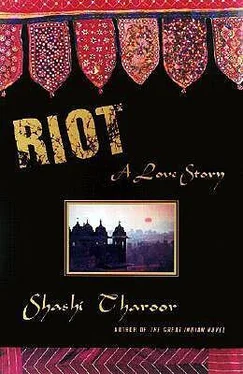Rudyard’s eyes alighted on the two framed photos on the desk. One was of me, alone, taken a year previously in New York, by her. The other was a much older picture, taken at the Red Fort in Delhi back in 1978, of the five of us as a family. The children are grinning and squinting at the camera and Rudyard has his arm around me. An innocent tourist moment, but I could imagine Priscilla looking at it over the years, seeing it as an icon of what she had cherished and lost.
Rudyard averted his eyes from the photos and walked to the almirah. Once again, Kadambari produced a key and opened the door. Rudyard almost recoiled from the sight of himself, red-eyed and perspiring, in the mirror on the inside of the door. A few cotton dresses hung limply from wooden hangers. Rudyard pulled open a drawer and found himself holding Priscilla’s underthings. He withdrew his hands as if scalded.
A fly buzzed around the room. The sounds of the street were fainter here, filtered by the stillness in our hearts.
I got up from the bed and began to look at everything in the room, touching each of her dresses, searching the pockets, emptying the drawers. I didn’t know what I was looking for. Clues, perhaps, but to what? The Zalilgarh authorities weren’t looking for anything; they knew she’d been killed in a riot, like seven other people, and that was good enough for them. Clues to her life, perhaps, were what I needed, rather than to her death. Something that would help me understand what she was experiencing here in Zalilgarh, something that would help me hear the stories she would never be able to tell me again.
Rudyard, still perspiring, looked numbly at our daughter’s personal possessions, the final legacy of her short life. I could see him struggling to contain something within himself, something he had never felt and did not know how to express. It was there in his strained and sweating face, in the way his brow seemed knit in perplexity and pain. He was staring at each book, each garment, as if unable to comprehend what it was doing there, what he was doing with it. We had to pack, of course, take her things away. Where would we take them? For what purpose? Her clothes, in particular, would be pointless to carry to America. Better to give most of them away here, where others would be glad to have them.
But packing gave us something concrete to do. When I supplanted him at the almirah Rudyard sat silently in the chair, staring vacantly at the wall, and Kadambari stood at the door chewing her paan and watching us. As I struggled with Priscilla’s suitcase, though, Rudyard got up and heaved it onto the bed. It was half full of papers, research notes, and a few souvenirs she was no doubt planning to bring to America — a decorative brass plate, a hand-carved wooden box, two embroidered cushion covers. These were simple things, pleasing to the eye, bought cheaply at the local bazaar. They would, I decided, travel back with us as Priscilla had intended them to.
We worked in silence. Neither Rudyard nor I could say a word, at this time, in this place, to each other. I did not trust myself to speak and, as always, tried to find strength in focusing on the practical. Housework and relocation had saved my sanity when my marriage ended; packing and sorting would see me through my pain today.
I looked through the contents of Priscilla’s drawers before putting them away, and found nothing unusual. I took the bedspread, with its distinctively Indian paisley pattern, but left the coarse white sheet. The clothes Priscilla would never wear I folded into the second piece of luggage. I might have offered them to Kadambari except that she showed not the slightest interest in what I was doing, and I could not imagine her in a dress anyway. I would ask the kind Mr. Das of HELP-US whether he could think of people to give them to. Fortunately Rudyard paid no attention to Priscilla’s toilet bag, because he would have been horrified by two things inside it. A vibrator. And a partly used strip of birth-control pills.
The latter surprised me more than the former. I had assumed Priscilla would be alone here, and I knew she had broken up with her last boyfriend before coming to India. I could not imagine why she would need to use birth control in Zalilgarh.
I found no clues among her papers, though I knew I would need to go through them carefully again. There were two letters from me, but none from any of her friends. A couple of sheets of half-done drawings, some scribbled lines of verse: that was all. Everything else was related to her work for HELP-US or her thesis research. I was sure there was more, somewhere. Priscilla would have made jottings, sketched, kept a diary, written poetry. I knew my daughter well enough to be sure there was something else.
Kadambari took the smaller bag and left the room. Rudyard moved to close the suitcase on the bed. I picked up the old photograph on the desk, intending to put it in my handbag along with the picture of myself that had kept my daughter company for the last ten months. But before I could put it away, Rudyard’s hand, oddly unfamiliar, fell upon mine.
“Can I have that?” he asked, his voice thickening.
You have no right, Rudyard, I thought. You’re the one who destroyed the world that photo depicts.
But I didn’t say that. I said, “Of course, Rudyard.”
As I gave it to him he slumped onto the bed, and I found myself holding him as he sobbed uncontrollably, his head hot and wet against my ribs, his body racked with regret. I realized then that, in all the years I had known him, and in all the years of our marriage and its collapse, I had never seen him cry.
from Lakshman’s journal
May 3, 1989
We meet every Tuesday and Saturday at the Kotli, just before dusk. She comes on her bicycle, through the gate I showed her; I have slipped her a copy of the key to the padlock. She always arrives first, wheels her cycle in, and hides it where I have shown her, behind some shrubbery. When I arrive in my official car, there is no sign that anyone is there. This is a sensible precaution, because though I usually let the driver off, sometimes I have no choice but to keep him and I don’t want him putting two and two together and coming up with 22. Sometimes my work delays me; Saturday is a working day for me, ostensibly half-time, but half-time can stretch well into the afternoon. Fortunately, on Saturdays Geetha always goes with Rekha for an early evening puja to the Shiva Mandir and never notices what time I return home.
At one time I had begun to disapprove of Geetha’s pujas: there is a swami resident at the Shiva Mandir who has an unsavory reputation for dabbling in tantric practices and other activities on the wrong side of the law. Before I got to Zalilgarh there were rumors of human sacrifices that could never be proven, and the swami has henchmen — he calls them disciples — who look as though they would not think twice before devoutly slitting your throat on his orders. But tantra is hardly Geetha’s thing and the DM’s wife can scarcely be in any danger, so I didn’t put a stop to her regular visits. And now it’s convenient. With Geetha at the temple, I don’t have to worry so much about the time. When I am held up at the office and arrive at the Kotli later than promised, Priscilla is always there, in the room at the top of the stairs, reading or writing in her scrapbook, or simply looking out at the river and the sky turning inky as dusk descends.
She always rises to greet me, with a smile that warms my soul. We embrace, we kiss — long, cool, lingering kisses unlike any I have ever had — and sooner or later we fall onto the makeshift bed and make love. We find more and different ways to make love, experimenting not because we are jaded but because of our delight in discovering new ways of knowing each other. Afterwards we talk, lying side by side or more often on top of each other.
Читать дальше












